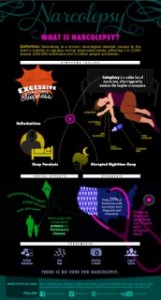Julie’s poster says it all!

It is just amazing to find a very coherent blog by Julie Flygare on the subject of narcolepsy. Click here to read more.I always hesitate to read websites about the condition because I have found it makes me too gloomy. When I first showed symptoms our dour Scottish GP told my mother that it was growing pains. No one had heard of narcolepsy and my Mother was inclined to suspect that I was “trying it on” – especially when she noticed that if I was really enjoying myself I did not doze off. However she must have been really worried and she was always the most sensitive person when I started to doze in public – for instance, while eating a meal when we were on board ship en route for Rhodesia, (Zimbabwe). She would say, “Janie, I forgot my hanky – could you pop back to the cabin to get it for me?”
It was our lovely family doctor in Rhodesia, the late Dr Ann Martin, who first mentioned “narcolepsy” – she had found it in one of her medical books. She then researched possible treatments, and gave me a prescription for Dexedrine. The tablets did not seem to make any difference so we abandoned the treatment. I was still at school and, to all intents and purposes, managing. My teachers never commented – perhaps they failed to notice or perhaps because I was a grade A student. And my Parents did not seem to be aware how many catnaps I snatched while shut in my room doing my homework. I tribute my survival to this fact: I was never given a label. I was expected to get on with life.
 Follow
Follow
I’m sincerely glad that not being labeled worked to your benefit. It can be a boon to be treated with the assumption that you are strong enough to fight your problems and win.
I would never want to suggest that this be the standard approach, though. I’m narcoleptic, though technically I have “borderline” narcolepsy by my sleep study results, since in my young adult brilliance I pinched myself constantly to stay awake for the last of my nap sessions to get out of the clinic a few minutes early…then nearly feel asleep on my drive home. Which brings me to my point: many/most narcoleptics can’t fight sleep attacks indefinitely. For those who rely on public transportation and don’t work in life or death situations, the worst that is likely to happen is a slight reduction in productivity. As someone in the USA, and not in one of its biggest cities, our public transportation is laughable. A 35 minute car commute is the only real option.
I had to be off my meds for two years – pregnancy & breastfeeding. It was terrifying to even think of driving, but for a while it seemed like my hormones (or improved/heavily restricted diet?) tamed my symptoms. I thought I could reduce or eliminate my meds since I had clearly won with mind over matter.
Now that my body is back to normal I’m useless without the stimulants. My young daughter can be crying, hungry or hurting, and I can’t bring myself to even sit up – after getting 8 hours of sleep. That’s the ultimate example for me of why I will no longer try to fight it on my own. In my case, the label has been nothing but helpful.
As I said, I’m truly happy that your situation worked out. I just wanted to share my experience as to why labeling can be better, and in many cases, far less dangerous.
You are right about medication and absolutely right about taking it. Thank you for your comment – back when I was nineteen the options were “dexedrine” and “ritalin”. Today much more is known about medicating narcolepsy, thank goodness.